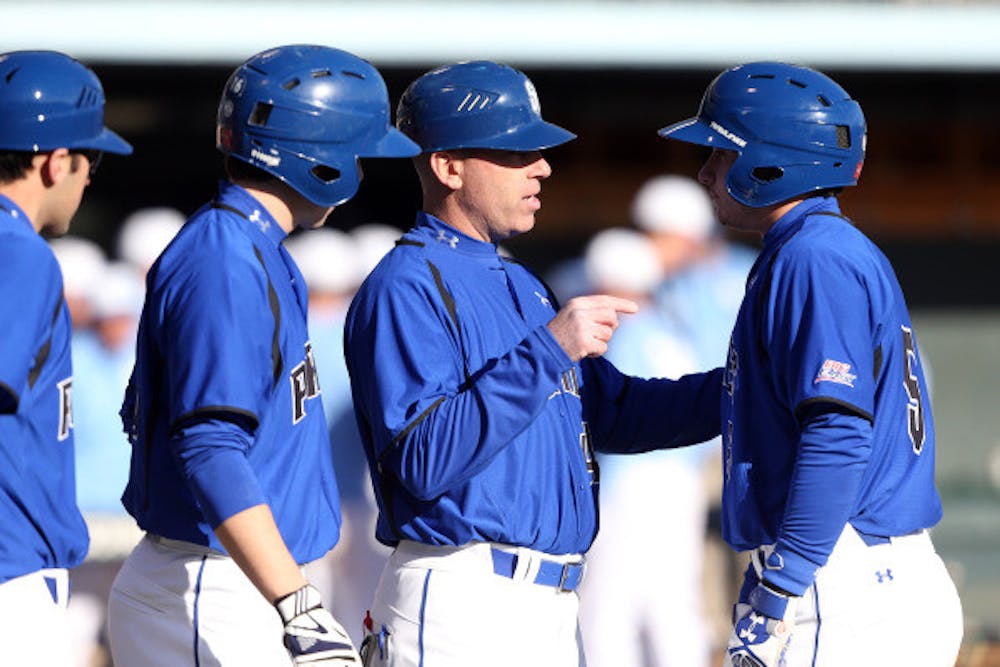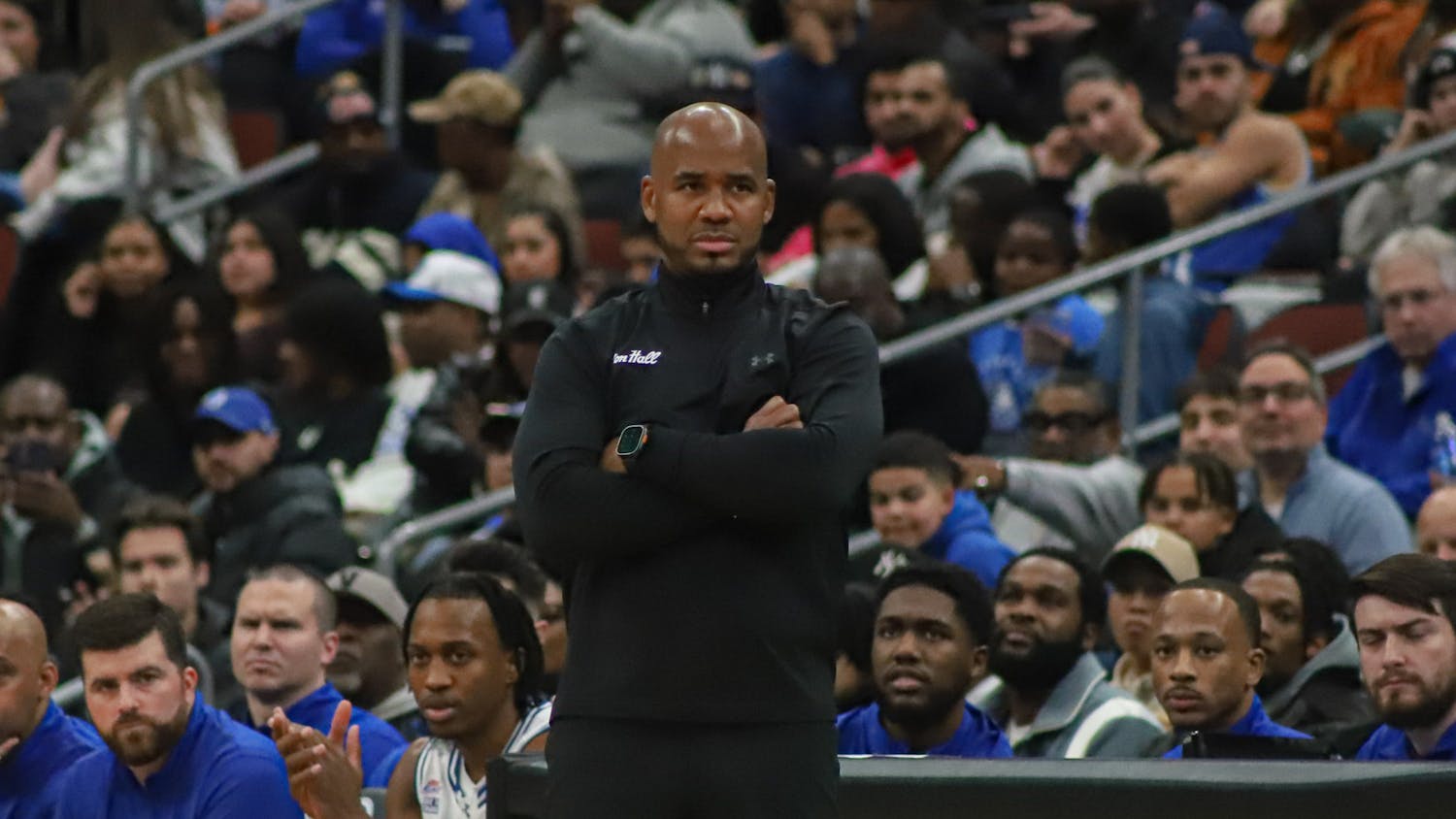[caption id="attachment_12965" align="alignnone" width="600"] Seton Hall Athletics[/caption]
Seton Hall Athletics[/caption]
It was the last Friday before Thanksgiving, Nov. 20, 2015 to be exact. For some it was just another day closer to Turkey Day, but for the Seton Hall baseball team it was the day they ran “The Rock.”
“Let’s go men, let’s go,” head coach Rob Sheppard said to his team as he was ushering his players out of the Richie Regan Athletic Center. It was 54 degrees out and partly sunny that morning, but the weather did not matter. The team was going to run that day rain or shine.
The eight-mile uphill run has been a part of the program for over 30 years. It signifies the culmination of all the workouts and conditioning the team does in the fall. The run is seen as a useful tool not only to see if all the players are in shape, but to build team camaraderie that will help once games are being played in the spring.
“The whole idea behind the run is that it’s not just about the physical aspect of it and running eight miles, but a lot of it is mental,” Sheppard said. “We tell our guys that the real challenge is dealing with adversity. Your mind tells you to stop, but you have to keep going and that helps us come time for the season.”
Running “The Rock,” – which mostly takes place at South Mountain Reservation – is not the only reason why Sheppard’s program has been a model of consistency for the past 40 years; it is the play on the field that makes the team stand apart.
Sheppard’s father, Mike Sr. was the coach at Seton Hall from 1973-2003. Under his tutelage, the Pirates won 20 or more games 30 times, 30 or more games 22 times, and 40 or more games five times. He holds a career record of 998-540-11 and ranks in the top- 75 on the list of the NCAA’s all- time winningest coaches.
Rob Sheppard was named the head coach of the program on June 30, 2004, becoming just the third head coach at Seton Hall since 1948. The team is coming off its fifth straight season with at least 25 wins. The Pirates qualified for the Big East Tournament for the fifth consecutive year in 2015, earning the number three seed.
The program has not won fewer than 17 games since 1972, before Mike Sr. took over the program.
“We have certain traditions here and it works for us,” Rob Sheppard said. “There’s a certain culture that is here and everyone has to buy in for us to be successful and the kids do a great job of that.”
*****
Sports fans often hear the cliché that close teams are like family, but when it comes to SHU baseball, it truly means something.
“This is a unique program,” senior center fielder Derek Jenkins said. “For a family to be so involved with a team and a university for this long, it is only natural that some traditions and things rub off on us.”
Before Rob Sheppard was the head coach or even the assistant coach of the program, he was playing for his father. His older brothers Mike Jr. and John played for the program as well at shortstop and second base, respectively, in the 1980s. As a player, Rob helped Seton Hall to four Big East Tournament appearances and served as a captain for a Pirate team that finished second at the Big East Tournament in his senior season.
Mike Jr. – the oldest – is currently the head coach at Seton Hall Prep. He marvels at the job his little brother has done.
“Well, the apple doesn’t fall far from the tree,” Mike Jr. said. “Just being around the game of baseball and the profession of coaching and teaching, I guess it was only natural for us to get involved and try to carry on what our dad did.”
The Sheppard sons both share teachings that their father used when they played under him and they believe it has helped them in their progression as coaches.
“I will never ask my guys to do something that I never did when I was a player,” Rob Sheppard said. “My dad pushed us to the limit when we were players and doing this run and I try to do the same for these guys now.”
Sheppard’s players appreciate the fact that their coach has been in their shoes at one point. He has had to deal with frustrating moments, hitless streaks, lack of playing time or playing a bit banged up. He’s been there.
“I think it’s great that they (the coaches) do everything with us,” Zach Prendergast, a junior pitcher, said.
“They run with us, they lift with us; not a lot of programs do that. It just shows how close we are and shows that they are grinding with us.”
Sheppard and his staff are just doing what the previous staffs did as he tries to show his players that they are one unit working towards a common goal.
“I’m going to give 100 percent of what I have and I ask the kids to do the same,” Sheppard stated. “We’re all in this together and that is what I tell them constantly.”
*****
“I think we’re the hardest working team in the country,” Joe Poduslenko, junior shortstop, said. “That comes from Coach and what he instills in us every day and how we should approach things not only in baseball, but in life.”
Coach Sheppard believes that his job is a lot more than just trying to get wins in the spring, but he wants to prepare his young men for life and sometimes that means tough love.
“We’re the program that tells kids what they need to hear, rather than what they want to hear,” he explained. “We challenge our kids so they can be ready to face whatever adversity may come their way.”
Sheppard likes to see how his players react to tough moments and he believes that once his players know how to overcome those moments, it betters their character and the character of the team.
A perfect example of this is junior infielder Mike Caputo.
It is hard to have a better beginning to a career than Caputo, who made his collegiate debut with a start at second base on Opening Day. He went 4-for-5 with two RBIs and a triple at Oklahoma on Feb. 14, 2014. Unfortunately for the Morganville, N.J. native, he finished his freshman year with a .233 average, a number of defensive miscues and without a regular spot in the lineup.
“I really had to reevaluate my play after freshman year and coach challenged me to do so,” Caputo said. “I really never experienced anything like my defensive struggles my freshman year and it was really humbling and I knew I had to put extra work in and Coach was right there in my ear keeping me motivated.”
Caputo has spent the majority of his past two summers working to better his game, especially defensively. Going into this season he is ready to help contribute to the team regularly.
“Not playing every day was frustrating, but now I know I wasn’t ready and although I didn’t see it at first, Coach was just trying to help me be a better player by just observing.”
Sheppard stated that watching his players mature and come to figure out things on their own is one of the best feelings he has as a coach. He said watching Caputo go through that self-realization process was a proud moment for him.
“Not everything is going to go your way – you’re going to have a rough game – and sometimes you’re going to be taken out of games, but you have to face that,” Sheppard said. “To have the ability to answer the call later on and see where improvements need to be made just shows the type of person Mike Caputo is. He’s a Seton Hall baseball player.”
What does that mean?
“It means being a blue-collar worker,” Sheppard said. “Someone who comes in everyday ready to grind and do all he can to help us get better.”
A lot of programs have different inspirational mantras, but Sheppard is not about words; he coaches by way of action. Even though it gets tougher every year, he runs “The Rock” with his team, not just to show that he can, but to show his players that he is consistent in his approach.
Sheppard makes it a point to practice what he preaches. In the world of Seton Hall baseball, everyone is better off because of it.
Christian Pierre-Louis can be reached at pierrech@shu.edu or on Twitter @CPLouis_.





